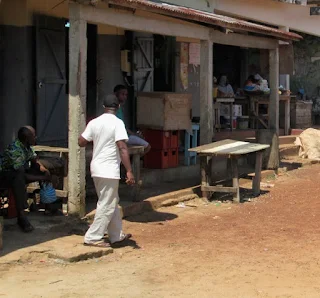Oral history in Gabon faces challenges intertwined with the impact of colonialism. Colonial powers disrupted local narratives, imposing their perspectives and erasing indigenous voices. The legacy includes gaps, distortions, and loss of cultural nuances in Gabon's oral history. The forcing of colonial narratives leads to biased oral history and written accounts.
Find more African interpretations of sacred texts in the
African Bookshelf Hub.
Navigating Oral History, Colonial Shadows, and the Resilience of the Indigenous People in Gabon
In 1492, Christopher Columbus, an Italian explorer sponsored by Spain, embarked on his first voyage across the Atlantic. On October 12, 1492, he reached the Americas, making landfall in the present-day Bahamas.
Before Columbus, around 1440, Portuguese traders arrived in the coastal areas of Gabon. It was in this West African region where Portuguese traders were most active in enslaving the Mpongwe and numerous other tribes. During this period, Gabon also got its name in a general way to designate the river of that name and all the adjacent territory.
Before Portuguese traders arrived in the coastal areas of Gabon, it was written in a book by Robert H. Milligan that the Mpongwe society was divided into three classes. The largest class was made up of slaves. Then, there was a middle class comprised of those who were free but had some slave ancestry. Finally, there was a minor aristocracy of pure non-slave Mpongwe descent.
Note: Per Milligan, in his book The Fetish Folk of West Africa, during an interview with a Mpongwe woman, it was stated, 'Domestic slavery is rarely attended with the usual horrors of European enslavement. Mpongwe slaves were serfs rather than slaves. Until the advent of the white slaver, they were rarely sold or exchanged. Mpongwe slaves were sometimes taken for debt and sometimes stolen from other tribes."
The local trade networks of the Duma, Nzebi, Mpongwe, and Mbete started interacting with European traders. However, the specific names of these networks were not widely written about or documented. From the 1760s onward, the trade dynamics shifted, with a significant emphasis on the slave trade for about a century.
In Gabon's forgotten oral history before colonialism, the Fang people, mainly in Gabon's interior, were known as fierce fighters with a fascinating history of fighting against the Portuguese. Their social structure, traditional beliefs, and oral traditions have been integral in shaping the collective consciousness of the Fang community. However, in written documentation, the Fang were described as an interior tribe that consisted of mere bush animals. The Fang people belonged to the orders of lower animals, cannibals.
In the past, many African kingdoms in Gabon took part in the slave trade, but the Fang people were different. Unlike other kingdoms around them, they did not get involved in this challenging aspect of history. The powerful Fang people showed remarkable strength and independence by avoiding the pressures and temptations of the slave trade. This special choice highlights the Fang's strong commitment to keeping their culture intact and staying independent.
French is the official language of Gabon, an African country. French became the official language of Gabon due to the country's colonial history. Gabon was a French colony from the late 19th century until gaining independence in 1960. Adopting French as the official language reflects the enduring influence of colonial rule. While this has facilitated communication and administrative functions, it presents challenges for
preserving and transmitting oral history.
Many indigenous communities in Gabon have rich oral traditions, but the imposition of a foreign language hinders the seamless passing down of oral cultural narratives. The linguistic shift poses difficulties in maintaining the authenticity and
nuances of oral history, as the French language does not fully capture the depth and cultural specificity inherent in the indigenous languages.
Colonial powers, propelled by imperial aspirations, negatively impacted Gabon's oral traditions. The imposition of foreign narratives and disruption of local languages and dialects resulted in the distortion and erasure of indigenous voices. The colonial era and beyond brought forth many challenges, including cultural appropriation, loss of linguistic nuances, and the imposition of biased perspectives that persist in shaping historical accounts.
The far-reaching oral history of many African tribes will remain unknown. Amidst the turmoil of colonialism and its far-reaching impacts, the Fang people emerged as guardians of a remarkable and distinctive oral narrative, not as cannibals but as fierce fighters. Despite their many challenges and obstacles, the Fang maintained their autonomy and independence narrative to future generations.



